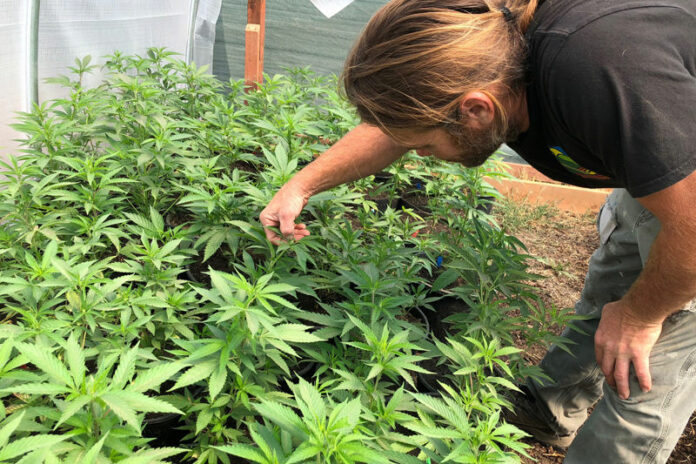It’s no secret that people in Sonoma County were growing cannabis before the January 1 legalization took place. Now, those who want to cultivate for profit can do so legally, but for most cannabis growers, coming out into the light can be a risky move.
“We came out to be compliant, but when we do we get hit over the head,” said cannabis farmer Tatum Trantham.
Trantham is one of three business partners of Sonoma Reserve, Inc., a cannabis farm in the Palmer Creek area. He said their goal is to be the number one cannabis cultivator in the county that is fully compliant with the law.
“It’s been tough because of clarification and because of opposition,” said Vasco de Mello, Sonoma Reserve, Inc. chief executive officer.
De Mello said the team has been working with the county to make sure they follow all regulations. The process has taken more than a year and cost $800,000 to $900,000 in property acquisition and permits. None of the partners say they have seen a profit in return.
“We are struggling to survive with the hopes of a promise that we will be licensed,” Trantham said.
The farmers currently use less than an acre to cultivate cannabis. In the last year the county has reported receiving more than 200 cannabis applications. Trantham said he understands the overload, but also wants the due processe owed to him and his partners.
“We want to be treated fairly,” he said.
For Petaluma Hill Farms co-owner David Drips, it’s all worth the risk. “We grow it because we believe in it,” he said.
In addition to around 2,000 cannabis plants, Drips grows potatoes, tomatoes, cauliflower, watermelons and other produce. He said he sold his business to be a full-time farmer and invested approximately $900,000 to become a compliant cannabis cultivator.
Drips faith in cannabis stems from his own medical issues as an epileptic patient as well as his father’s battle with cancer. “I believe in the power of the plant,” Drips said.
While the workers on Petaluma Hills Farm get paid, Drips and his business partner are still waiting for their payout. “They’ve got us trapped in conception,” he said.
The opposition
Expense and regulation changes aren’t the only challenges the cannabis industry is facing. Another big deterrent for legal cannabis farmers is the backlash from neighbors who cite water scarcity, traffic and the potential for crime, among other intrusions into remote, rural neighborhoods.
Both Sonoma Reserve and Petaluma Hill Farms have been met with opposition as they work to maintain compliancy. de Mello said Sonoma Reserve has felt a strong hostility from neighborhood groups like Save Our Sonoma Neighborhood and those associated with the Palmer Creek and Mill Creek watersheds.
de Mello said Sonoma Reserve has received 10 code enforcement visits after being falsely accused. “The enemy has been the opposition,” de Mello said.
The neighborhood groups opposing cannabis cultivation and businesses are very clear that they don’t want a commercial scale business next door to them. They were unsuccessful in asking the county to create “exclusion zones” where no cannabis can be grown.
Tim Ricard, Sonoma County Cannabis Program Manager said the county has made the change to a very heavily regulated industry quickly.
“I think anytime there is new regulations or approved land use permits we need to make sure all view points are considered,” he said. “There’s a lot of passion on both sides of the issue.”
County regulations
Sonoma County created a cannabis program to act as the single-point contact for the public and departments involved in the regulation of cannabis. Ricard admits it’s a complicated business.
The county cannabis program works through several departments. Permit Sonoma handles land use, the Department of Agriculture Weight and Measures permits for pesticide control, the tax department handles taxation of cannabis businesses, the sheriff’s department handles code enforcement and the health department regulates dispensaries and edible manufacturers.
The county uses different processes for permits. Ricard said based on the size of the cannabis operations, a small indoor/outdoor zoning permit has less public review, is substantially cheaper at $2,500, and generally takes three months to permit.
A larger conditional use permit process can be up to $16,000 and take up to a year to process. The tax rate is based on square footage of the proposed operation.
At press time, Ricard said the county had approved a total of 25 cannabis licenses, including 18 cultivators, five dispensaries, one distributor and one manufacturer.
For county cultivators like Sonoma Reserve and Petaluma Hills Farm they can only wait for government officials to clarify regulations and find the best fit for cannabis in Sonoma County.
Latest developments
The Aug. 7 meeting of the Sonoma County Board of Supervisors brought significant changes yet again for small farmers in the unincorporated parts of the county.
In an effort to appease both sides of the cannabis issue, the board approved limiting most cultivation sites to properties 10 acres or larger, but allowing permitted cultivators or those with pending permits to be grandfathered in. Ultimately, the update excludes cultivation for future small-scale cannabis farmers.
For farmers like Drips, who fall under the category of the grandfather clause, a sigh of relief came when the board agreed to extend the use of permits from one year to two and five years for zoning and use permits. This type of stability has been absent from the industry since the legalization on Jan. 1.
“I think it went well, overall,” Drips said. The updates will be made official by vote of the board on Aug. 28.
72.6
F
Healdsburg
June 30, 2025









